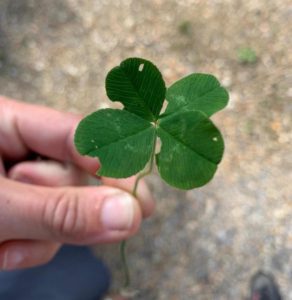Four leaf clovers - and other lucky objects

Clover (pictured) is one of those plants you probably never think about. It is small, it grows with grass, it has white pom-pom flowers that bees love, and it can be bad for cows if they eat too much.
However, one distinctive thing about clover is that each stalk has 3 leaves. Very occasionally (if you spend a long time looking at grassy areas) you will find a clover stalk that has freakishly grown 4 leaves. This is considered to be extremely lucky. I was therefore delighted to find this one… until I stung my hand on a stinging nettle about 2 seconds later.
So how lucky is a 4-leaf clover? No-one knows why they are considered lucky, although it is a very old belief. They are certainly fairly rare. According to a survey, there is about a 1 in 5,000 chance of finding one. However, as someone who has spent too much of her life searching through lawns, I can tell you that some clover plants regularly produce 4-leaf clovers – and once you’ve found one of those plants, you can go back and find more. Or maybe it just means I have lots of good luck! That’s a nice thought.
One of the strange things about lucky objects is that they vary from country to country. In Britain, things that are lucky are:
- 4-leaf clovers
- black cats
- horseshoes (pointing upwards)
- touching a piece of wood
- white-flowered heather
- wishbones from chicken carcasses
- floating thistle seeds
- the number 7.
Things that are unlucky are:
- walking under a ladder (clearly risky at the best of times)
- spilling salt
- breaking a mirror
- seeing a single magpie
- opening an umbrella in the house
- treading on pavement cracks
- the number 13
- any Friday that is also the 13th day of the month
In general, people are more concerned about things that are unlucky.
Much of the fear of the number 13 is because 12 is seen as a ‘whole’ number (12 months, 12 hours) – and 13 is somehow wrong in a way that 11 is not. It also comes from Christian beliefs because there were 13 people at the Last Supper, a meal that Jesus Christ shared with his disciples – before one of them betrayed him.
Because of this belief, you will often find there is no house number 13 on a street, there is no floor number 13 in a tall building and there is no seat number 13 in a theatre or cinema. But perhaps most scary of all is the sound of a clock striking 13 – said to predict something terrible…



